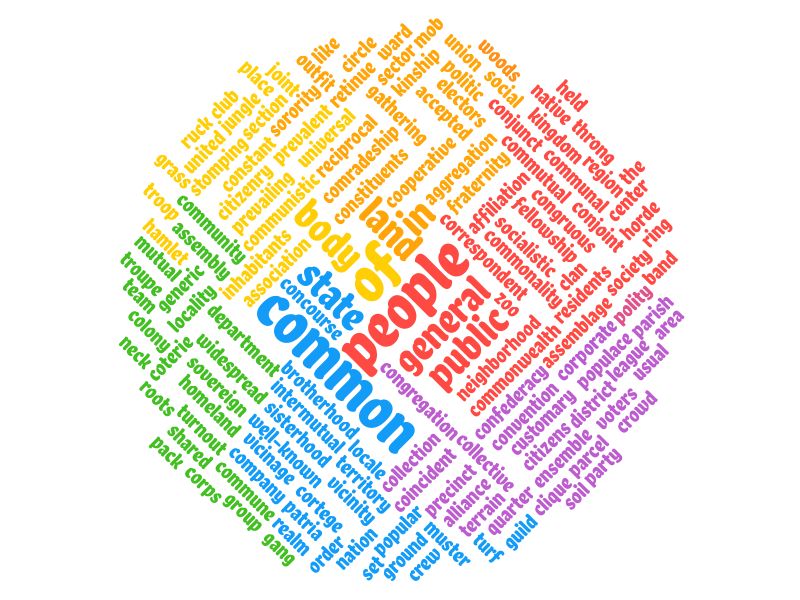
What’s in a word?
Recently I’ve been reflecting on the power of language and its ability to influence and fundamentally shape how institutions relate to the communities that they serve. In fact, the word ‘Community’ is a case in point – I am routinely struck by how often organisations find it difficult to express exactly who is meant by the word. Regardless of how many times it appears in their strategies, plans and job descriptions; the word Community has become a catchall phrase.
I would even go so far as to suggest that for many institutions ‘community’ in many cases can more realistically be defined as ‘whoever we can get to come to our events/meetings’ or ‘whoever we can get on board with our agenda’ or ‘whichever groups we can find in the area’ in a world where greater import is being placed on the contributions ‘community’ can make to all sorts of life outcomes and positive changes, large organisations are running the risk of using the local Voluntary Sector as a proxy for community with participation rarely going beyond the local clutch of established constituted groups.
The danger with this approach is that it perpetuates the lie that community is something which only occurs in the domain of formal, constituted, funded activities – this has the double effect of also downplaying the impact of the informal, associational space which is not valued and recognised to the same extent.
If you google (other search engines are available) ‘the definition of community’ the top answer is: “a group of people living in the same place or having a particular characteristic in common” or “the condition of sharing or having certain attitudes and interests in common”
No argument from me on that definition! But does that hold true in the many varied contexts in which the word is used? I’ll give you an example – recently I attended an event to hear about an approach called ‘Community Led Support’ at which no members of the community (i.e. people living in that place) were in attendance, in fact they weren’t even invited (I checked) on another occasion I managed to get over an hour into a workshop with staff from a Local Authority when it became clear that there was a serious discrepancy between our definitions of the word community, for some people in the room it meant specifically people who were involved in Town Council meetings and Ward Forums, for others it meant Voluntary Organisations and for others still (myself included) the googled definition held true.
Thinking about the ‘people living in the same place’ aspect of the googled definition led me to reflect on the fact that there are countless tiny acts of kindness occurring every day in streets and neighbourhoods around the globe, they often go uncelebrated and unrecognised (sometimes even by those involved). For me there is a huge power in the small, every day, informal contributions that people make to the life of the neighbourhoods and places where they live – they’re also generally overlooked by many institutions and community development programmes; in no small part because their innate informality, variety and reliance on association make them difficult to quantify, measure and control (the calling cards of service land); yet it is the informality, smallness and hyper-local nature of associational life that makes it so powerful!
Have you ever had a conversation with someone who when asked “how are you involved in your community”, answer with an emphatic “I’m not”! Then go on to share all the things they do for their friends, relatives, and neighbours on a day to day basis, such as checking on older neighbours; chatting to people over the garden fence etc, all the things that I would describe as being absolutely ‘community’ minded! These small, simple contributions have been overlooked for so long that people assume when we ask about ‘community’ it must be the orchestrated, constituted, funded, formal space that we’re talking about.
We should acknowledge, celebrate and value the everyday contributions that people make – we need to remind folks that this is what community is made of! Don’t get me wrong – I appreciate the value and contribution of funded projects, constituted groups, community events and all other organised activities in community life, but let’s create space in the conversation for the associational, informal stuff too, the beautiful, powerful, everyday contributions of people in neighbourhoods up and down the land – it’s not about introducing something that isn’t there, it’s about celebrating what is already there and attributing value to it through recognition.
The word community has become the stock and trade of the professional – used to describe everything and everyone in all sorts of different contexts according to vagaries of Services and Institutions shifting priorities, as a result it has lost its meaning and power.
If we’re looking for a word to replace it, then how about the word ‘neighbour’ instead? It’s hard to imagine someone organising a ‘Neighbour Led Support’ event and intentionally not inviting neighbours to join in! One of my favourite conversation pieces that we use in our ABCD workshops is to ask people to “think of a time when neighbours came together to make things better” I love the simplicity of the language, there is no ambiguity with the word neighbour, it’s a word that we can all relate to which places the emphasis neatly in time, space & place.
Words have much more power than we give them credit for – let’s use them wisely!
Chris Chinnock

Larry Eve
A very accurate sad and compelling article this Chris
Keep up the amazing work
Hope to see you soon
ChrIs Chinnock
Thank you Larry! Much appreciated my friend!
James Moore
Insightful reading and a great conclusion to the article.